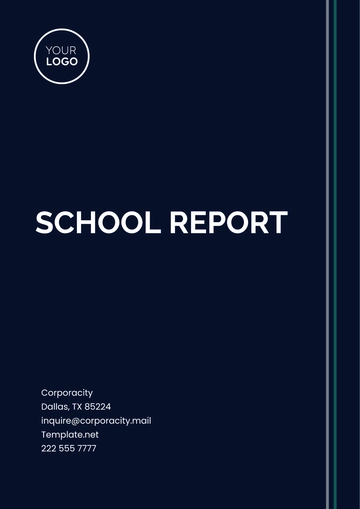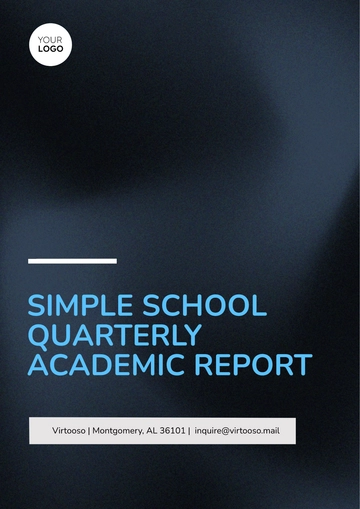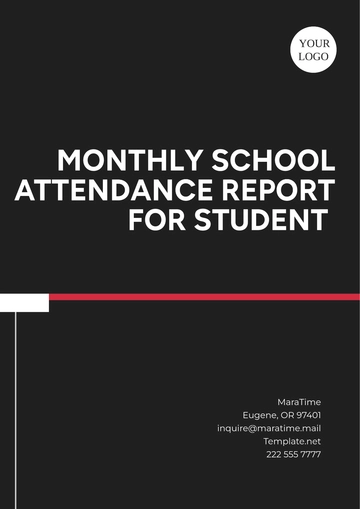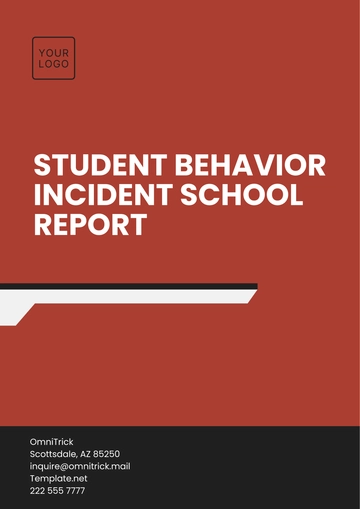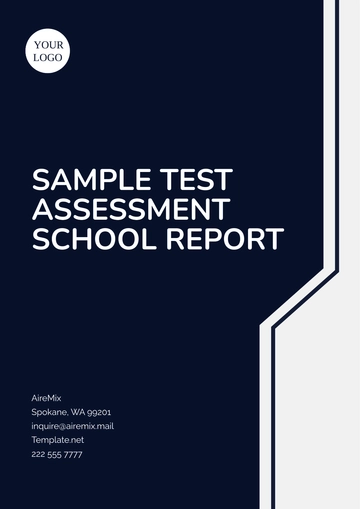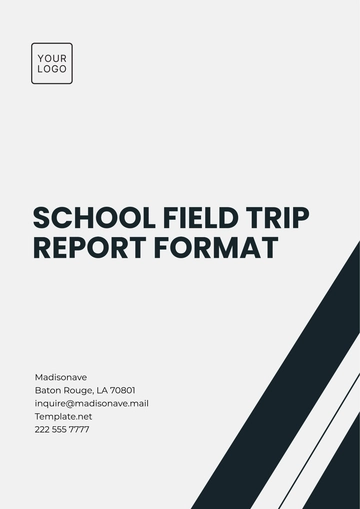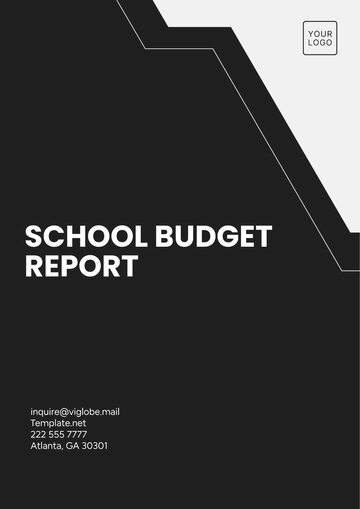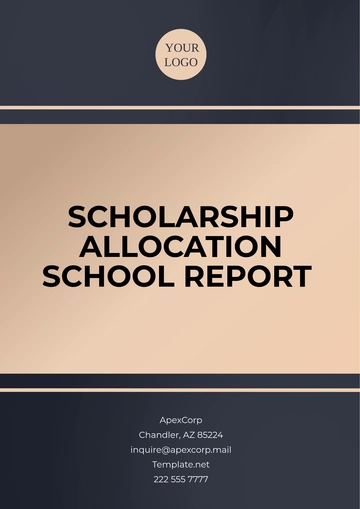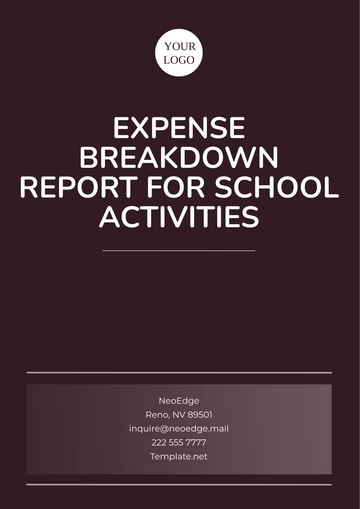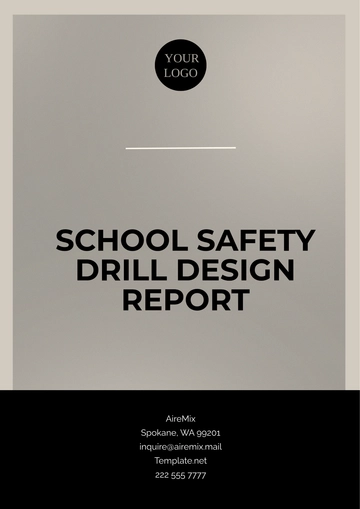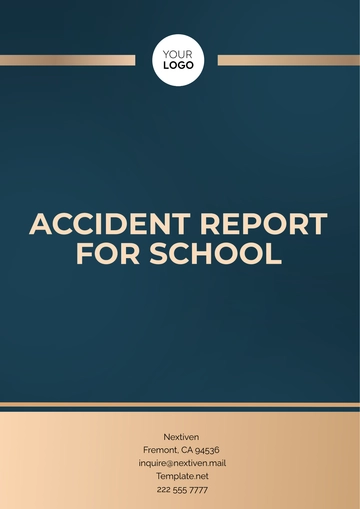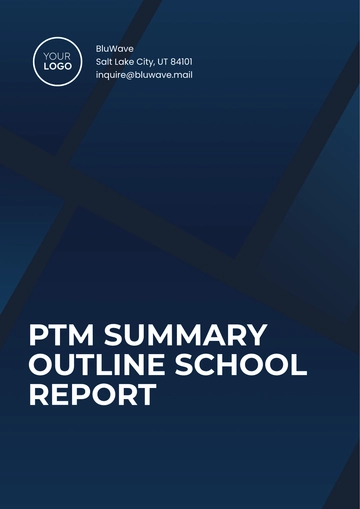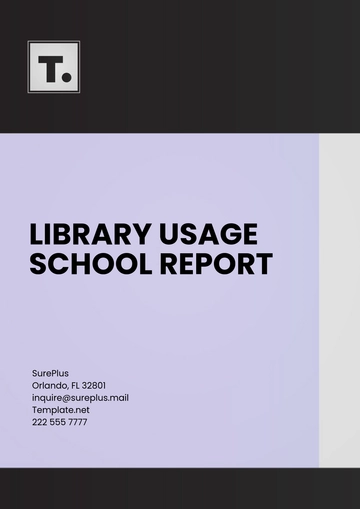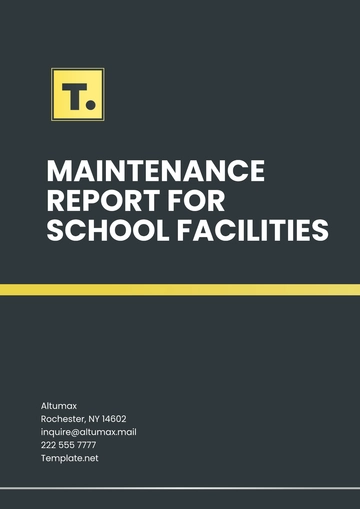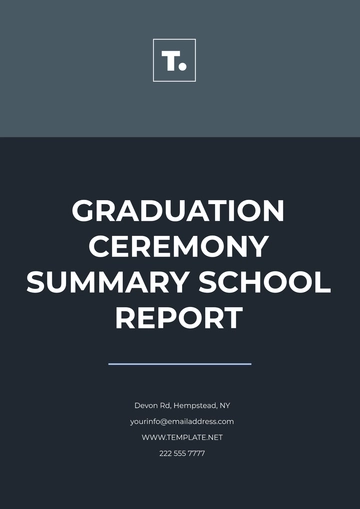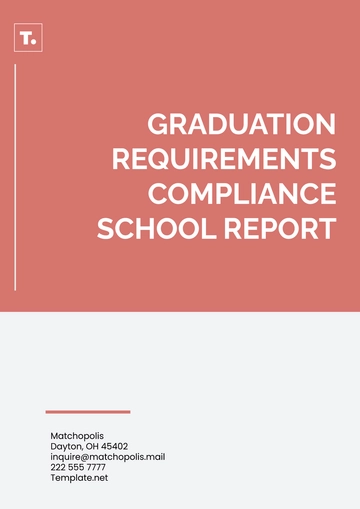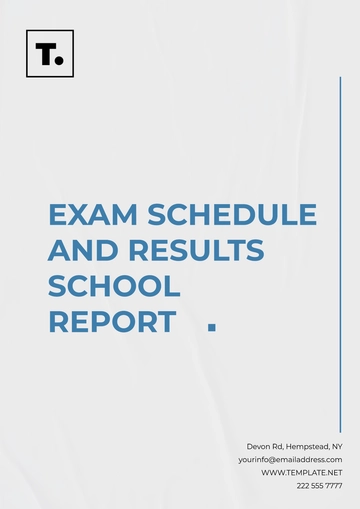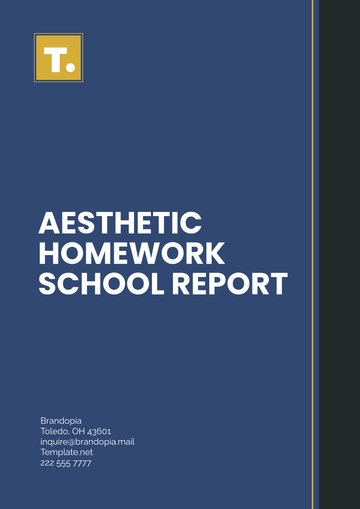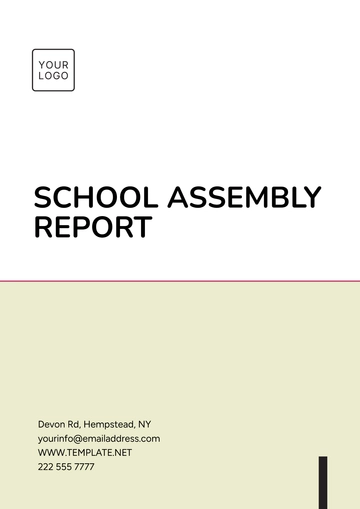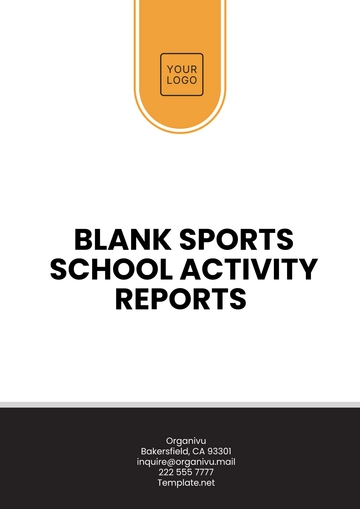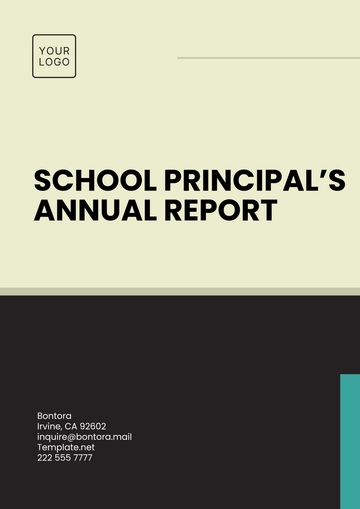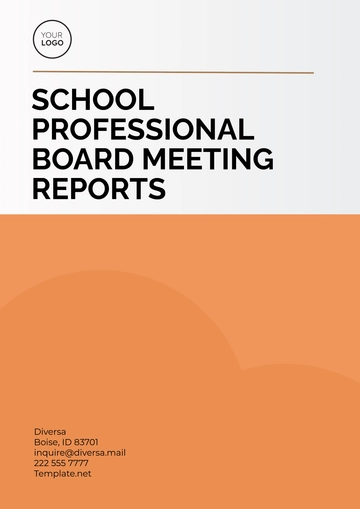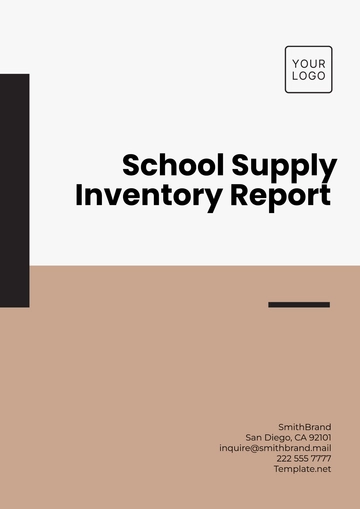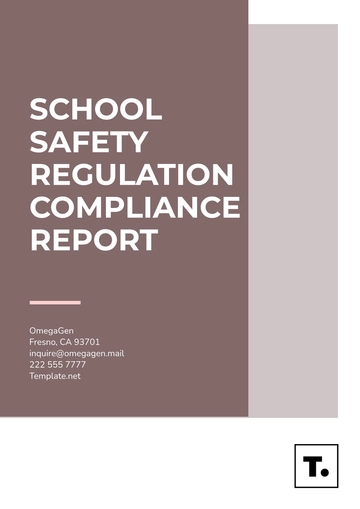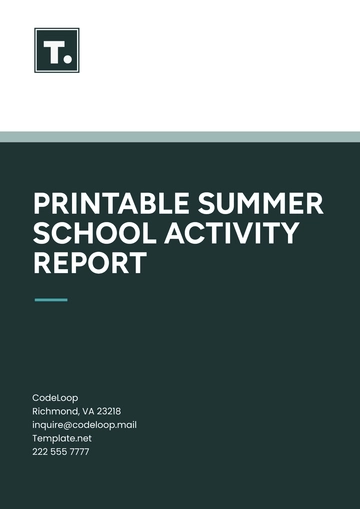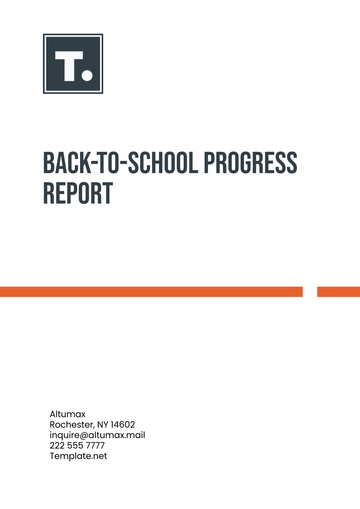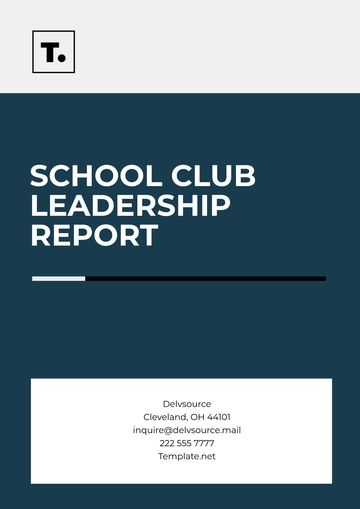Free School Student Weekly Report
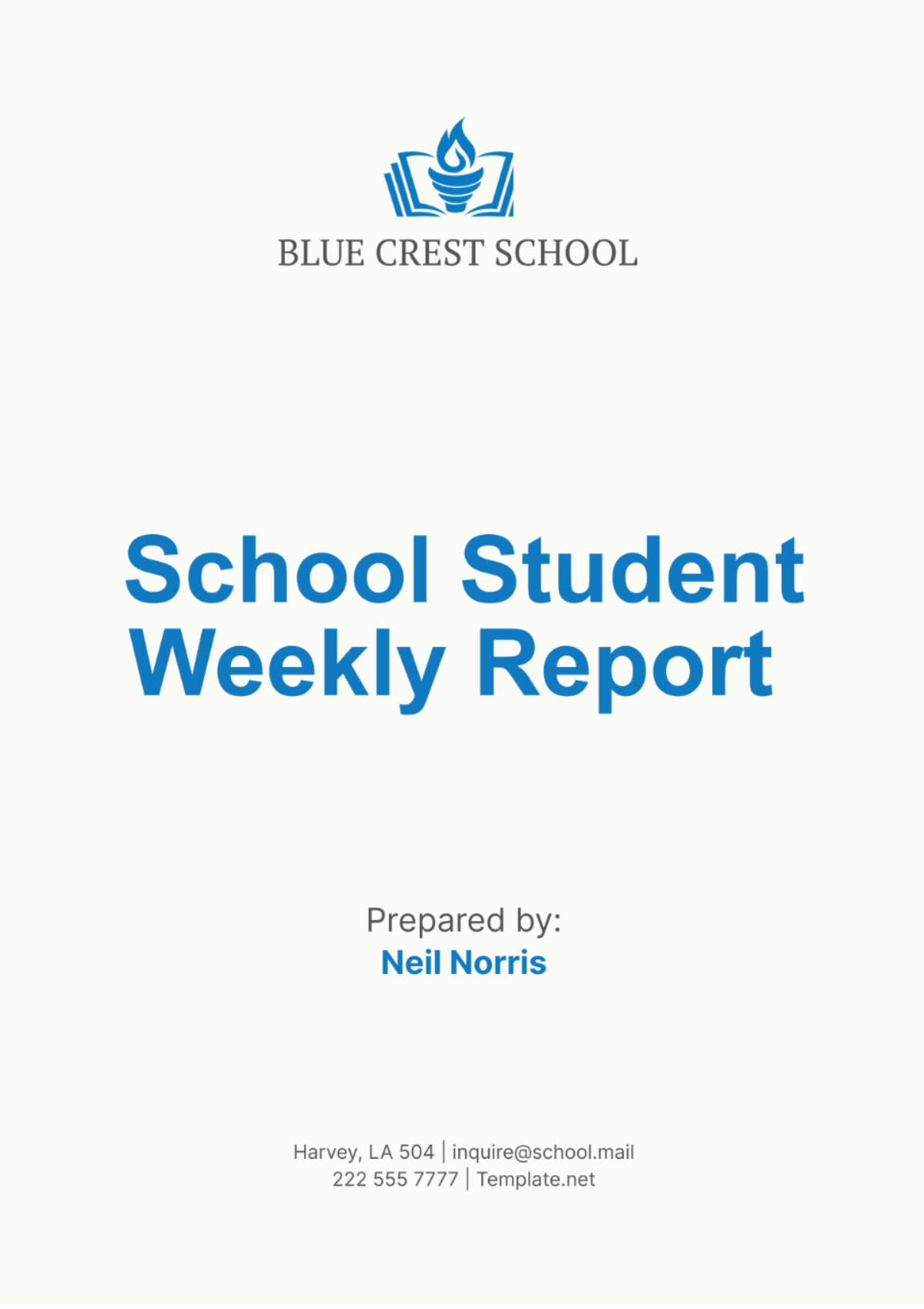
School Name: [Your Company Name]
Date: [Date]
Student Name: [Student's Name]
Grade: [Grade Level]
Homeroom Teacher: [Teacher's Name]
Parent/Guardian: [Parent/Guardian's Name]
Contact Information: [Parent/Guardian's Email], [Parent/Guardian's Phone Number]
I. Introduction
The purpose of this School Student Weekly Report is to provide a comprehensive overview of [Student's Name]'s academic performance, behavior, and overall progress during the week. This report aims to keep parents/guardians informed and engaged in their child's education, fostering a collaborative effort to support the student's growth and development.
II. Academic Performance
Academic performance is a critical aspect of a student's development, reflecting their understanding of the subjects taught and their ability to apply knowledge. This section provides a detailed overview of [Student's Name]'s performance in various subjects, highlighting strengths and areas needing improvement. It also includes feedback on homework, assignments, and test results to give a complete picture of the student's academic standing.
A. Subject Overview
Subject | Teacher's Name | Grade | Comments |
|---|---|---|---|
Mathematics | Mr. Wilkins | B+ | [Student's Name] has shown significant improvement in algebra. Needs to focus on geometry. |
Science | [Teacher's Name] | A- | Excellent understanding of recent biology topics. Participates actively in class discussions. |
English | [Teacher's Name] | B | Good comprehension skills. Should work on essay writing and grammar. |
History | [Teacher's Name] | A | Demonstrates a strong grasp of historical events. Completed all assignments on time. |
Physical Education | [Teacher's Name] | A | Very active and engaged in all physical activities. Shows great team spirit. |
Art | [Teacher's Name] | B+ | Creative and enthusiastic. Needs to refine some techniques. |
B. Homework and Assignments
[Student's Name] has been consistent in completing his homework and assignments on time. This week, [Student's Name] submitted a well-researched science project on ecosystems, which received positive feedback from [Teacher's Name]. However, he needs to improve the quality of his essays in English, particularly focusing on structure and grammar.
Subject | Assignment | Feedback |
|---|---|---|
Mathematics | Algebra Worksheet | Completed on time, needs more practice on solving geometry problems. |
Science | Ecosystems Project | Excellent research and presentation. Demonstrates a deep understanding. |
English | Essay on "To Kill a Mockingbird" | Needs to improve structure and grammar. Good analysis of themes. |
History | WWII Timeline | Accurate and detailed. Well-organized presentation. |
C. Tests and Quizzes
[Student's Name] performed well in his weekly quizzes. His scores were as follows:
Mathematics: 85% on the algebra quiz
Science: 90% on the biology test
English: 78% on the comprehension quiz
History: 92% on the quiz about World War II
These results reflect [Student's Name]'s strong understanding of most subjects, with room for improvement in English.
Subject | Test/Quiz | Score | Feedback |
|---|---|---|---|
Mathematics | Algebra Quiz | 85% | Strong performance in algebra, needs more practice in geometry. |
Science | Biology Test | 90% | Excellent grasp of recent topics. Participates actively in class. |
English | Comprehension Quiz | 78% | Good understanding but needs to improve on grammar and structure. |
History | WWII Quiz | 92% | Demonstrates a strong grasp of historical events. Well-prepared. |
III. Behavioral Report
Behavioral performance is essential for a student's overall development and success. This section provides insights into [Student's Name]'s behavior in the classroom, social interactions with peers, and areas for improvement. Understanding these aspects helps in fostering a positive and conducive learning environment.
A. Classroom Behavior
[Student's Name]'s behavior in the classroom has been exemplary. He is attentive and participates actively in discussions, especially in science and history classes. His teachers have noted that he is respectful and collaborates well with his peers during group activities.
Behavior | Feedback |
|---|---|
Attention | Always attentive and participates actively. |
Participation | Engages well in class discussions, especially in science and history. |
Respect | Very respectful towards teachers and classmates. |
Collaboration | Works well in group activities, often takes a leadership role. |
B. Social Interactions
[Student's Name] has a good circle of friends and is well-liked by his classmates. He often takes on leadership roles during group projects and is known for his ability to mediate conflicts and encourage teamwork.
Interaction | Feedback |
|---|---|
Friendships | Has a strong circle of friends and is well-liked. |
Leadership | Often takes on leadership roles during group projects. |
Conflict Mediation | Known for his ability to mediate conflicts and encourage teamwork. |
Teamwork | Encourages collaboration and positive interactions among peers. |
C. Areas for Improvement
While [Student's Name]'s behavior is generally positive, it has been noted that he sometimes becomes distracted in English class. [Teacher's Name] has recommended that he sit closer to the front of the classroom to help maintain focus.
Area | Feedback |
|---|---|
Focus in English | Sometimes becomes distracted, recommended to sit closer to the front. |
Participation | Should participate more actively in English class discussions. |
Homework Habits | Needs to improve the quality and structure of English essays. |
IV. Attendance
Attendance is a critical factor in a student's academic success. Regular attendance ensures continuous learning and helps in maintaining a consistent academic performance. This section provides a detailed record of [Student's Name]'s attendance for the past four weeks.
A. Daily Attendance Monitor
Week | Monday | Tuesday | Wednesday | Thursday | Friday |
|---|---|---|---|---|---|
Week 1 | Present | Present | Present | Present | Present |
Week 2 | Present | Present | Present | Present | Present |
Week 3 | Present | Present | Present | Present | Present |
Week 4 | Present | Present | Present | Present | Present |
[Student's Name] has maintained perfect attendance for the past four weeks, with no absences or tardiness. His punctuality is commendable and reflects his commitment to his education.
B. Attendance Summary
Maintaining a consistent attendance record is crucial for academic success. [Student's Name]'s perfect attendance over the past four weeks indicates his dedication and commitment to his studies. This consistency not only supports his learning but also sets a positive example for his peers. Regular attendance helps in reinforcing learning, understanding complex concepts, and participating in class activities, all of which contribute to overall academic excellence.
Attendance Record | Week 1 | Week 2 | Week 3 | Week 4 |
|---|---|---|---|---|
Present | 5 days | 5 days | 5 days | 5 days |
Absent | 0 days | 0 days | 0 days | 0 days |
Tardy | 0 times | 0 times | 0 times | 0 times |
[Student's Name]'s attendance record is exemplary, with no absences or tardiness reported. His consistent presence in class contributes significantly to his academic performance and overall progress. It is essential to continue this pattern to maintain and enhance his educational experience.
VI. Teacher's Comments
A. Mathematics - [Teacher's Name]
"[Student's Name] has made remarkable progress in algebra this week. His ability to solve complex equations has improved, and he is actively participating in class. I recommend he spend extra time reviewing geometry to strengthen his understanding."
B. Science - [Teacher's Name]
"[Student's Name]'s enthusiasm for biology is evident in his class participation and project work. He asks insightful questions and demonstrates a deep understanding of the material. Keep up the great work, [Student's Name]!"
C. English - [Teacher's Name]
"[Student's Name] is a diligent student, but he needs to focus more on his writing skills. His comprehension is good, but his essays require better structure and grammar. I suggest he attends the after-school writing workshops for additional support."
D. History - [Teacher's Name]
"[Student's Name] is excelling in history. His grasp of historical events is impressive, and he always submits his assignments on time. His recent project on World War II was thorough and well-presented."
E. Physical Education - [Teacher's Name]
"[Student's Name] is very active in PE class and displays excellent sportsmanship. He is a team player and always encourages his classmates. His performance in the recent soccer match was outstanding."
F. Art - [Teacher's Name]
"[Student's Name] shows great creativity and enthusiasm in art class. He has a good eye for detail but needs to refine his techniques. I recommend he practices more at home to improve."
VII. Goals for Next Week
Setting specific, achievable goals for the upcoming week is crucial for [Student's Name] to maintain and improve his academic performance and behavior. These goals are designed to target areas where he can enhance his skills and address any noted challenges. Below are the detailed objectives for each subject and behavioral focus.
Mathematics: Focus on Understanding Geometry Concepts
Objective: Improve understanding and application of geometry concepts.
Action Plan:
Daily Practice: Spend at least 30 minutes each day working on geometry problems, focusing on areas such as angles, triangles, and circles. Utilize online resources and geometry apps that provide interactive problems and instant feedback.
Seek Help: Attend additional help sessions offered by [Teacher's Name] to clarify doubts and reinforce learning. Engage in peer study groups to discuss and solve geometry problems together.
Use Visual Aids: Incorporate visual aids such as diagrams and models to better understand geometric relationships and properties. Drawing shapes and labeling their parts can help in visualizing and solving problems.
Expected Outcome: By focusing on these strategies, [Student's Name] should gain a stronger grasp of geometry, reflected in improved quiz and test scores and increased confidence in tackling geometry-related questions.
English: Improve Essay Writing Skills by Attending the After-School Writing Workshops
Objective: Enhance essay writing skills, focusing on structure, coherence, and grammar.
Action Plan:
Attend Workshops: Participate in the after-school writing workshops organized by Mrs. Lee. These workshops will provide targeted instruction on essay structure, thesis development, paragraph organization, and grammar.
Practice Writing: Write an essay each week on different topics to practice and apply the techniques learned in workshops. Request feedback from [Teacher's Name] and peers to identify strengths and areas for improvement.
Read Regularly: Engage in regular reading of various genres to understand different writing styles and improve vocabulary. This will also help in developing ideas and arguments for essays.
Use Writing Tools: Utilize grammar and style checking tools like Grammarly to identify and correct errors. These tools can also provide suggestions for improving clarity and coherence.
Expected Outcome: With regular practice and feedback, [Student's Name] should see significant improvement in his essay writing abilities, resulting in better grades and greater confidence in his writing skills.
Science: Continue Participating Actively in Class Discussions and Projects
Objective: Maintain and enhance active participation in science class to deepen understanding and engagement.
Action Plan:
Prepare in Advance: Review the upcoming topics before class to be ready for discussions. This preparation will enable [Student's Name] to ask relevant questions and contribute meaningfully to class conversations.
Engage in Projects: Take on leadership roles in group projects and ensure active involvement in all stages, from planning to execution. Collaborate effectively with peers and share responsibilities.
Ask Questions: Continue to ask insightful questions during lessons to clarify concepts and explore topics in greater depth. Participate in any extra-curricular science activities or clubs to further enhance understanding and interest.
Expected Outcome: Active participation will help [Student's Name] solidify his understanding of scientific concepts and foster a greater interest in the subject, which will be reflected in his class performance and project outcomes.
History: Maintain the High Standard of Work and Keep Up with Reading Assignments
Objective: Sustain excellent performance in history by consistently completing reading assignments and maintaining the quality of work.
Action Plan:
Set a Reading Schedule: Allocate specific times each day for history reading assignments to ensure they are completed promptly. This will help [Student's Name] stay on top of the material and be prepared for class discussions and quizzes.
Take Notes: While reading, take detailed notes highlighting key events, dates, and figures. This practice will aid in retaining information and provide a useful reference for studying.
Review and Revise: Regularly review notes and previous assignments to reinforce learning. Engage in discussions with classmates to exchange insights and deepen understanding of historical events.
Seek Feedback: Request feedback from [Teacher's Name] on assignments to understand areas of excellence and those needing improvement. Use this feedback to refine future work.
Expected Outcome: Consistent reading and engagement will help [Student's Name] maintain his high performance in history, ensuring he continues to excel in assignments and tests.
Behavior: Minimize Distractions in English Class by Sitting Closer to the Front
Objective: Improve focus and minimize distractions in English class to enhance learning and participation.
Action Plan:
Change Seating: Move to a seat closer to the front of the classroom as recommended by [Teacher's Name]. This position will reduce distractions and enable better concentration on the lessons.
Eliminate Distractions: Identify and eliminate sources of distraction (e.g., avoid sitting near chatty peers, turn off mobile devices) to maintain focus during lessons.
Engage Actively: Participate more actively in class discussions to stay engaged and attentive. Prepare questions and comments on the reading material to contribute meaningfully to class.
Monitor Progress: Regularly check in with [Teacher's Name] to assess progress and make any necessary adjustments to strategies for improving focus.
Expected Outcome: By minimizing distractions, [Student's Name] will be able to focus better during English lessons, leading to improved comprehension and performance.
VIII. Parent/Guardian Feedback
Parents and guardians are encouraged to provide feedback on this report. Your input is valuable in helping us support [Student's Name]'s education and development.
Comments:
Signature:
![]()
[Parent/Guardian's Name]
Date: [Date]
IX. Conclusion
[Student's Name] has had a productive week, demonstrating strengths in multiple subjects and areas for improvement in others. His active participation in both academic and extracurricular activities is commendable. We look forward to continued progress and collaboration with his parents/guardians to support his educational journey.
For any questions or concerns, please contact [Your Company Name] at [Your Company Email] or [Your Company Number].
- 100% Customizable, free editor
- Access 1 Million+ Templates, photo’s & graphics
- Download or share as a template
- Click and replace photos, graphics, text, backgrounds
- Resize, crop, AI write & more
- Access advanced editor
Effortlessly track student progress with Template.net's School Student Weekly Report Template. Tailored for educators, this editable tool simplifies monitoring academic performance and behavior. Customize with our AI editor to detail achievements, challenges, and goals. Enhance communication between school and home with clear, concise reporting. Empower student success—streamline your weekly reports today with ease and efficiency.
You may also like
- Sales Report
- Daily Report
- Project Report
- Business Report
- Weekly Report
- Incident Report
- Annual Report
- Report Layout
- Report Design
- Progress Report
- Marketing Report
- Company Report
- Monthly Report
- Audit Report
- Status Report
- School Report
- Reports Hr
- Management Report
- Project Status Report
- Handover Report
- Health And Safety Report
- Restaurant Report
- Construction Report
- Research Report
- Evaluation Report
- Investigation Report
- Employee Report
- Advertising Report
- Weekly Status Report
- Project Management Report
- Finance Report
- Service Report
- Technical Report
- Meeting Report
- Quarterly Report
- Inspection Report
- Medical Report
- Test Report
- Summary Report
- Inventory Report
- Valuation Report
- Operations Report
- Payroll Report
- Training Report
- Job Report
- Case Report
- Performance Report
- Board Report
- Internal Audit Report
- Student Report
- Monthly Management Report
- Small Business Report
- Accident Report
- Call Center Report
- Activity Report
- IT and Software Report
- Internship Report
- Visit Report
- Product Report
- Book Report
- Property Report
- Recruitment Report
- University Report
- Event Report
- SEO Report
- Conference Report
- Narrative Report
- Nursing Home Report
- Preschool Report
- Call Report
- Customer Report
- Employee Incident Report
- Accomplishment Report
- Social Media Report
- Work From Home Report
- Security Report
- Damage Report
- Quality Report
- Internal Report
- Nurse Report
- Real Estate Report
- Hotel Report
- Equipment Report
- Credit Report
- Field Report
- Non Profit Report
- Maintenance Report
- News Report
- Survey Report
- Executive Report
- Law Firm Report
- Advertising Agency Report
- Interior Design Report
- Travel Agency Report
- Stock Report
- Salon Report
- Bug Report
- Workplace Report
- Action Report
- Investor Report
- Cleaning Services Report
- Consulting Report
- Freelancer Report
- Site Visit Report
- Trip Report
- Classroom Observation Report
- Vehicle Report
- Final Report
- Software Report
